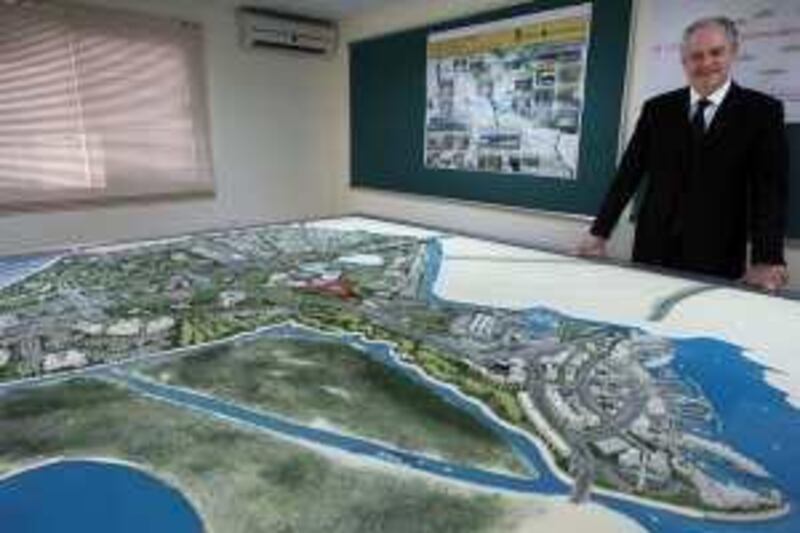ABU DHABI // Managers of the Abu Dhabi Grand Prix say that they are "duty-bound" to use the circuit to improve road safety standards in the country. The first Abu Dhabi Grand Prix will be held on November 1, but the Yas Marina Circuit is likely to be put to other uses for 300 days of the year, away from the Formula One race weekend.
Among the initiatives being planned is a driving school for youngsters that will teach them basic road safety skills before they begin driving lessons on the roads. Richard Cregan, chief executive of Abu Dhabi Motorsport Management (ADMM) who will manage the circuit, said it was crucial that the organisation "put something back into the community in terms of safe driving". That would be done by making the circuit accessible to the public for most of the year, he said.
Announcing ADMM's support of The National's Road to Safety campaign, Mr Cregan said his organisation would be "supporting any campaign to make the roads a safe place to be". "One of the projects we are working on internally is the possibility to have a driving school for young people - a pre-driving facility, if you like," he said. "What we would like to do is work with various different bodies and authorities to give 14-year-old kids the opportunity to come and drive in a safe, controlled environment and learn how to control a car, and have that as part of the education to achieve a driving licence. Then we would really be contributing to making roads safe.
"It is an issue that needs to be addressed, and we know there are a lot of different bodies, including The National, Health Authority-Abu Dhabi (HAAD) and Salama [doing this]. "The current situation is raising awareness to the public. Everybody is aware of the figures and the sad amount of people lost due to road accidents. "What we need to do is join up all the various initiatives and do something."
Last year, 1,071 people died on the roads in the UAE, and 12,273 were injured, according to statistics from the Ministry of Interior. Talks between ADMM and various authorities about how the circuit can be used as part of wider road safety measures are continuing. ADMM plans eventually to employ driving instructors to work on the Formula One circuit and on the adjoining 1.2km-long go-kart course. A 30,000-square-metre facility planned for the circuit on Yas Island will be used to teach driving skills such as controlling a skidding car.
Research conducted for the Ministry of Interior by the British-based Transport Research Laboratory found that 32.5 per cent of serious road accidents in the UAE and 37 per cent of all road accidents over the previous five years were caused by new drivers. Drivers aged 18 to 27 were also found to be responsible for 35 per cent of all collisions. In March, the ministry announced that it was to standardise driving tests across the emirates after identifying variations in driving instruction as a factor in accidents. The unified system has yet to be approved by the Cabinet.
As well as working with authorities to improve road safety awareness, Mr Cregan said he hoped some of the biggest names in F1 would be able to co-operate when they visit Abu Dhabi this year. "We are going to have the cream of the world's racing drivers on Yas. There are opportunities here to use these key figures to raise awareness. Whatever we can do as individuals or as a group, we are duty-bound to do that."
This month, Sheikh Khalid Al Qassimi, the first Arab driver to score points in the World Rally Championship and the face of HAAD's road safety campaign, said he believed the Yas Marina Circuit would provide a venue for the country's drivers to harness their skills and to unleash their "speed demons". "Packages and programmes could be arranged to allow people to drive around on the track with special cars and release that speed in the right place," he said.
"Hopefully, that will help reduce accidents." Mr Cregan said that, as well as aiming to improve driving standards, ADMM would be putting a five-year strategy in place in the coming months. One of the aims, he said, was to identify young driving talent in the UAE and train youngsters to a competitive level. "We will be in a position to take a young driver from a karting situation all the way through Formula racing or rally car racing. There is a huge passion for cars in general, and we need to develop that.
"I am sure that in a couple of years, and we have already seen it in rallying, I don't see any reason why we won't see a driver in F1 from the UAE. "We have the tools to achieve it, we just have to apply the management." At the launch of the Abu Dhabi Grand Prix last year, the ADMM chairman Khaldoon al Mubarak said future champions would have to be identified at age six or seven. "Through this, we will have the opportunities to bring young - very young - drivers and develop them in the more classical way," he said.
Mr Cregan said the key was to develop an interest in motorsport in general in the UAE before young talent could be identified. "We have to work on the awareness of motorsport. The big thing is the F1. But we have to make sure we go out there to the general public to show them the possibilities there are." rhughes@thenational.ae






